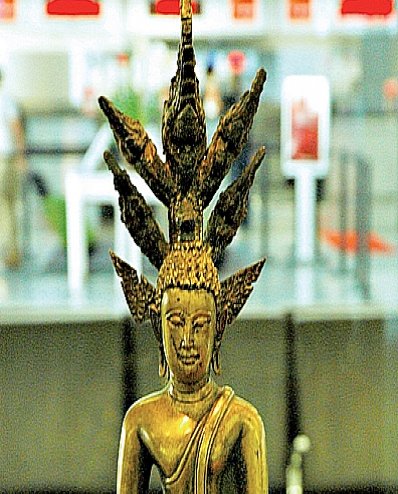Phuket Lifestyle: Take the art – leave the real antiques here

PHUKET: A dispute about the export of art and religious objects between the Thalang National Museum and a Phuket shop was tentatively set to rest after a meeting on December 15.
The museum’s concerns that there was a risk of valuable national treasures being illegally exported from Thailand was looked into during the meeting headed by Vice Phuket Governor Somkiet Sangkaosutthirak.
The parties seeking mediation were Vanvilai Limsuepehua and Sumate Kangsaprudtikul, owners of a Patong shop, specializing in antiques and objects of art, and Sukkamol Wongsawan and Kreethapol Yokjaroen, curators of the Thalang National Museum.
The curators were concerned about religious objects being exported, which they said is a sensitive issue to Thai Buddhists. However the shop owners were seeking permission from the Vice Governor to export their Buddhist art objects.
Ending the meeting Vice Governor Somkiet gave his permission for the shop owners to export the Buddha statues in question, but did ask the couple to consider selling other art objects instead of religious items. He also emphasized that the curators must continue to carefully examine artifacts before they were sent abroad.
The Thalang National Museum curator Kreethapol Yokjaroen told the Phuket Gazette, “Foreigners want to take Buddhist art objects out the country almost as soon as they buy them. However, we have to examine them to ensure they are not ancient and that they have the correct documentation to allow them to be exported from Thailand.”
“Previously, the process would take about two weeks to complete. However, with a number of government officials and examining committee members being transferred this year, the process is now taking about three weeks,” Mr Kreethapol said.
“Permission is only granted for complete Buddhist religious items. Export permission will not be given for fragments of Buddhist objects or those carved from tree roots,” he added.
Fragments of Buddhist statues are prohibited from export because of a history in Thailand of looters removing the heads from statues in archaeological sites and selling them. Buddha carvings crafted from tree roots are also banned from being exported due to them being considered sacrilegious by devout Buddhists. Root-wood coming from under the ground is considered unfit material for the full image of Buddha. In addition to this there is rarely enough wood from the roots to make a complete Buddha carving, also many of the trees that would be used are preserved in Thailand.
The committee, responsible for controlling the export of antiques, consists of the Director of the 15th Regional Office of Fine Arts Phuket, two archaeologist professors, a senior technique artisan and the head of Thalang National Museum. The Phuket Governor, who presides over the committee once matters have reached an advanced stage, makes the final decision on whether or not an object can be exported.
Speaking about his work Mr Kreethapol said, “Up to this point we’ve not discovered any authentic relics. Mainly we see imitations of ancient artifacts produced anytime from the Ayutthaya period (circa 1867) to now.”
“When we have completed our part of the process, the permission documentation is sent to the Provincial Office for their action. Finally, it goes to The Fine Art Department for approval. Only then can the object be taken out of Thailand,” he said.
Currently, there are 42 shops in Phuket licensed to deal antiques. Collectively they export about a hundred art objects every year, Mr Kreethapol added.
Ms Vanvilai, whose shop has been open for more than 10 years and exported Buddhist art items for seven, explained, “Our Thai artists are professional Buddhist artists. I don’t want to see these skills lost. If they are, Thailand will lose out to China, which is also producing this art form.”
“We are doing two things here. We are maintaining jobs for Thai people and preserving our artistic cultural heritage,” she added.
Ms Vancilai explained that the most famous places for producing Buddhist art in Thailand are Tha Phra Chan, Bangkok and Chiang Mai. Tha Phra Chan is well known for the forging of bronze objects and Chaing Mai is best known for its Buddhist paintings, sculptures and carvings.
“Most our clients are foreigners. Before we sell and export items, we always tell buyers that the art is not ancient, it’s an imitation of ancient art. I always examine objects coming into our shop to make sure that we are not accepting original antiques or ancient relics,” she said.
“Besides,” she added, “real ancient items would fetch a lot more than the 2,000 baht ours start at.”
— Atchaa Khamlo
Latest Thailand News
Follow The Thaiger on Google News:


























